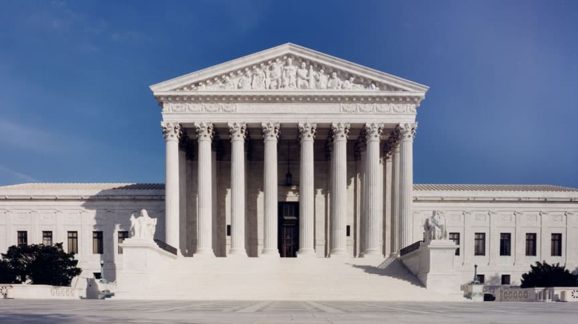Supreme Court Should Review Oregon’s Discriminatory Fuel Pricing Rules

 Last week, American fuel manufactures filed a petition to the U.S. Supreme Court asking them to review a lower court decision upholding an Oregon law which the manufacturers say was designed to inappropriately favor Oregon businesses and which regulates activities that occur entirely outside of the state. My colleague Marlo Lewis previously commented on the absurdity of the lower court decision when it was issued.
Last week, American fuel manufactures filed a petition to the U.S. Supreme Court asking them to review a lower court decision upholding an Oregon law which the manufacturers say was designed to inappropriately favor Oregon businesses and which regulates activities that occur entirely outside of the state. My colleague Marlo Lewis previously commented on the absurdity of the lower court decision when it was issued.
In 2015, Oregon passed a Low Carbon Fuel Standard (LCFS) which doesn’t just regulate the use of fuel in Oregon, but throughout the “life-cycle” of the product. This means that all of the steps of extraction, production, and transportation that occur prior to fuel arriving in Oregon will now effect how much consumers are required to pay. Oregon doesn’t even have any oil refineries, so the LCFS will, in effect, be imposed on refineries in other states. This even includes activities that occur entirely in foreign countries. The regulations are designed such that the closer to Oregon the fuel is produced, the fewer burdens it has—with in-state production bearing no burdens at all.
The American fuel manufactures argue that the purpose of the law is to benefit Oregon businesses at the expense of fuel manufacturers in other states, rather than merely to achieve its ostensible environmental goals. To support this they have pointed to a statement by the state’s former governor that the problem the legislation was trying to solve is that “Oregonians sent more than $6 billion out of state to import gas and diesel, while homegrown, low carbon fuel producers remain locked out of a promising market.” The governor described the purposes of these changes as to “Develop home-grown renewable energy resources … create rewarding local jobs … [and b]oost Oregon’s economy.” The chief sponsor of the bill said one of the purposes was to “create jobs right here at home.” The Oregon Department of Environmental Quality said that passing that law would create a “significant incentive to increase the production capacity of Oregon’s existing biofuels facilities and attract new biofuels production.” Oregon’s Environmental Quality Commission explained that the LCFS “provides a market incentive for locally produced fuels … which will create net jobs, make net improvements for household income, and be beneficial for Oregon’s Gross State Product.”
Despite the obvious market-rigging agenda touted in those statements, the Ninth Circuit said there is not even a plausible allegation that the law’s purpose was discriminatory in favor of Oregon-based businesses.
As to its discriminatory effect, the law effectively taxes companies based on how far their operations are from Oregon. Oregon companies receive favored treatment, while nearby states like Washington and California receive slightly less-favored treatment. No state in the nation experiences burdens as low as Oregon’s own companies. And yet the Ninth Circuit said that Oregon was merely discriminating based on “lifecycle greenhouse gas emissions, not state of origin.”
The effects of a ruling like this would authorize balkanization of the interstate market in which each state taxes all products based on how far away they are produced, making sure it is unprofitable to produce the products in another state. Stopping abusive practices like this is precisely the purpose of the “dormant” commerce clause.
Lastly, the law regulates activities that occur outside of Oregon, including in other countries. It is a core limit of the power of states that they can only regulate activities that occur inside their borders. Oregon has no fuel refining that occurs in the state, and yet refineries in other states will now have to pay extra, comply with the paperwork requirements documenting the amount of carbon dioxide they produce, and incur other such compliance costs. Oregon has no incentive to reduce such costs as the individuals thus regulated cannot vote for or against Oregon politicians.
The prohibition on extraterritorial regulation prevents big states, like California, from effectively forcing the entire interstate market to comply with their regulations. It also prevents multiple states from enforcing incompatible regimes that cannot be mutually complied with. Lastly, it prevents states from angering our international allies. International fuel manufacturers, based in places like Canada, are not going to be happy having their products taxed at a higher rate than U.S.-based products. And what happens when foreign governments start issuing their own tariffs in response? States are not meant to be able to interfere in foreign relations in this manner.
The Ninth Circuit held that this doesn’t apply as the requirements only apply to fuel sold in, imported into, or exported from Oregon. But this misses the point. The regulations may only trigger for fuel sold or imported into Oregon, but the regulations target activities that occur entirely outside of Oregon. Imagine a state requiring that all products (and all parts of those products) sold in a given state be made with at least some minimum wage. It would effectively either coerce out-of-state companies and/or balkanize the entire interstate market. We could not have an interstate market if such regulations were allowed. And yet this is exactly what the Ninth Circuit has endorsed.
It is for that reason that the Ninth Circuit’s Judge Milan Smith dissented from the opinion:
As a practical matter, this [program] not only exempts in-state entities from any burden under the law (to remedy deficits by purchasing credits from competitors), but it also affords them an additional subsidy in the form of valuable carbon credits. By contrast, out-of-state regulated entities, including American Fuel, generate deficits and experience the full impact of the law. . . . Thus, American Fuel plausibly alleges that the Oregon program discriminates in its practical effect.
There are plenty of good reasons for the Supreme Court to review this lower court decision, but especially for the disastrous potential consequences if more states start regulating in this manner.
Read the petition for a writ of certiorari before the U.S. Supreme Court in the case of American Fuel & Petrochemical Manufacturers, et al. v. Jane O’Keeffe, et al. here.